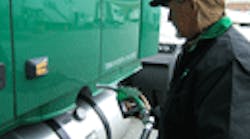A new bill introduced in the House of Representatives would allow eligible “small business concerns” to apply for a low-interest loan of up to $250,000 to help pay for increased fuel costs.
H.R. 6922, referred last week to the House Committee on Small Business, was sponsored by Rep. Brian Baird [D-WA], a member of the U.S. House Committee on Transportation and Infrastructure. It was co-sponsored by Rep. Norm Dicks (D-WA), Rep. Peter DeFazio (D-OR), Rep. John Salazar (D-CO), and Rep. Stephanie Herseth Sandlin (D-SD).
“Truckers provide the backbone of our nation’s retail economy, and an alarming number of trucking and transportation businesses are going belly up, unable to afford the rising cost of fuel,” Baird said. “Even more disturbing, some are being forced to choose between paying for safety repairs, and filling the gas tank. This legislation would provide them with a stop gap measure to help keep them, and our economy afloat.
“Just about everything you see on store shelves was brought there by a truck. We can not just sit idly by while a significant part of our nation’s economy disappears,” added Baird. “The federal government has devoted a lot of energy to backing up Wall Street in the past few days; we need to focus our attention on Main Street as well. This bill does that.”
Under the terms of the legislation, the Small Business Administration (SBA) would be authorized to offer emergency loans of up to $250,000 to “assist an eligible small business concern that has suffered or that is likely to suffer substantial economic injury as the result of increases in the price of gasoline or diesel fuel.”
The loan will be made without regard to whether the applicant is able to obtain credit elsewhere, the legislation said, and would be offered under terms similar to SBA’s “essential employee” program, which allows small businesses to seek disaster assistance if an employee who is a military reservist is called up for active duty.
According to Baird, an estimated 3,000 transportation-based companies have filed for bankruptcy this year, taking an estimated 90,000 trucks—almost 5% of the U.S. trucking capacity—off the road.
“The economic changes we’ve experienced over the past few months have been nothing short of disastrous,” Baird said. “As Congress readies a second stimulus package, this bill needs to be part of it.”
The Owner-Operators Independent Drivers Association (OOIDA) has supported the bill, asking truckers and their friends and families to call the offices of their Senators and Representatives to ask them to support H.R. 6922.
“Call the U.S. Capitol switchboard at 202-224-3121 and provide the operator with your home ZIP code,” said Rod Nofziger, director of government affairs for OOIDA. “The operator will connect you with the offices of your elected representatives.”



